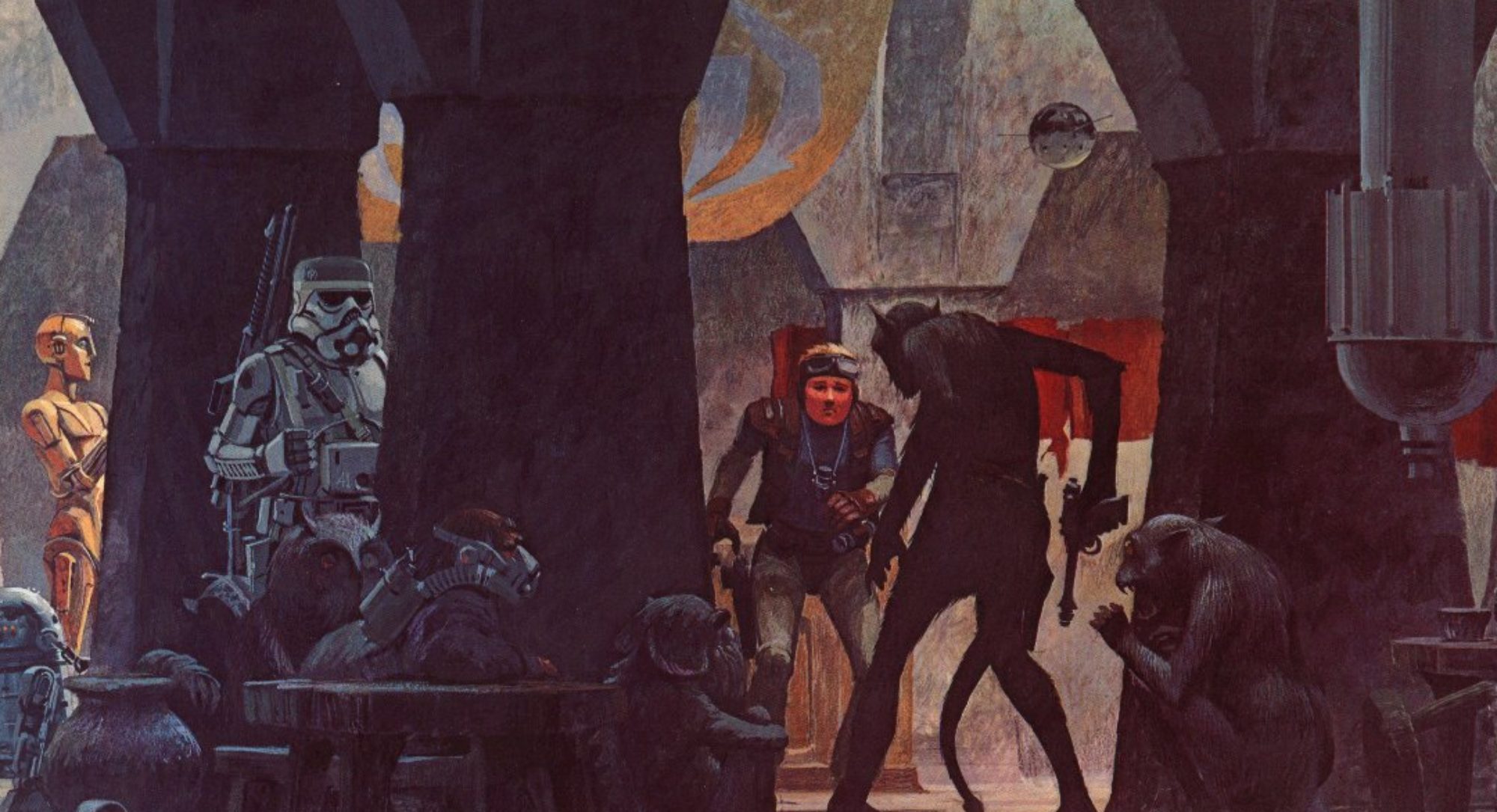So, Louis Porter, the dipshit who I mentioned in an earlier journal entry— the one who is doing a podcast telling newbies how to run an RPG business, despite being infamous for barely knowing how to do so himself— has just posted the latest episode of his little opus, where he talks about identifying your competition.
In the podcast, he talks about my company and my staking out of the pulp genre….and announces how he’s going to “take me on”, by doing Pulp as well, and pricing his stuff lower than mine, etc.
Given his well-established reputation for lack of quality, I don’t think I have anything to worry about. At ALL.
Doesn’t make it any less annoying, however. Especially annoying is his statement that the fact that my products are 100% Open Content will make it easier for him to take material from them, and use the material in his releases.
It would be nice is this hack could come up with his own shit, instead of producing slapped-together rip-offs of other publisher’s works, but hey, this industry seldom rewards integrity.


I took a look at his website and his product, and I have no clue who his target audience is? I get that he’s made a postmodern psuedo “Sin City” minus the things that make it interesting RPG, but is this aimed at the Cyberpunk crowd?
I’m just catching up to the concept of podcasts. Is Adamant Entertainment in the process of creating a podcast as well?
I’d say that this is good advertising were it not for the open-source aspect of it. Hmmm. I assume you put in allowable use language, so if it’s stolen -er- used for profit that you can put a stop to it?
Nonetheless, referring to your work is the clearest way for others to find your work. People aren’t as stupid as the presidential elections would suggest.
I’ve thought about doing the podcast thing….but honestly, I need to figure out a revenue model for it. I’m way too busy to do something like that for free. If I decide to do a podcast based on my experience as a consultant and publisher in the RPG business, I’d do it as a pay-per-download subscription service.
The terms of the license, unfortunately, allow for direct text use. So, no….no way to put a stop to it.
The reason I made my stuff 100% Open is to allow other publishers to cherry-pick the rules work for their own original projects (that’s the spirit of the license, after all)….however, unfortunately, that also allows people to, if they so desired, just directly take the text and re-sell it.
Hmmm… maybe the time has come to update your license? Y’know, using the language the Linux folks use. Here’s Wikipedia’s definition of “Open Source”:
http://en.wikipedia.org/wiki/Open_source
Don’t even get me started. It’s not true Open Source. It’s just a license that allows smaller publishers to produce material for the largest rules set (D&D, under the generic label of D20), and the terms are set by the publisher of D&D.
Aha, well then. Hmmm. Ever tried to write something directly for the Hasbro folks? I know some of them, might be able to get ’em to give you a look….
Well, he’s a business man doing business with his business. Also, we’re not friends. We’re cordial.
Nah, even with Hasbro/WotC’s rates, I make better money producing through Adamant, even with the threat of situations like this cropping up from time to time.
Yup. “Can’t even front”, and all that.
There really isn’t a revenue model for podcasting. There’s a lot of discussion about this in the podcasting community right now, and the reality of the situation is that nobody is making money off of podcasting. However, that’s not to say that there isn’t money to be made by doing a podcast. Mike Stackpole podcasts an abridged version of his writing newsletter, and he told me he can trace a significant bump in his newsletter sales to the show. His podcast is basically a fifteen minute infomercial for his existing product, and based on what he’s said, it appears to be working.
Maybe he’s just looking for a new playground because he’s not playing in the M&M Superlink area anymore.
So his stuff is going to be cheaper?
Awesome!
I was just trying to figure out what to get you for Christmas.
He’s probably hoping you’ll get all concerned about competition in the pulp field and spend your time trying to forge something else, while he swoops in and “steals” the field.
I’d pay for the opportunity to learn from your experiences in the RPG industry. I haven’t bothered to listen to Porter’s rantings since about the second or third podcast, but if you were to do something like that, I’d pre-pay for a subscription right now.
I don’t think a podcast is the best format for it though. If you were to do something like that, I think it would work better as a written product – something I could hold on to and reference as needed. I suppose the podcast could be saved, but referencing something in it at a later date would be a pain in the ass. Better to write up a series of industry “seminars” and sell them as PDFs, IMHO.
As for the risk of people snatching your products and underselling you with your own stuff, maybe it’s time to start restricting how much is open. While I appreciate (especially as an erstwhile publisher myself) your desire to let other publishers use what they will, you could still do that on an individual basis – just let it be known that you’re willing to work with people who want to use some of your published stuff, but make them come to you, so you have some control over where and how (and by who) it’s used. Then, in the PDFs, lock up everything but what you absolutely have to make open.
Me cago en tu puta madre, pendejo.
Most likely.
He’s going to be bitterly disappointed, I’m afraid.
I don’t speak Spanish…but I do speak that.
Ohhhhhhhhhhhh, what you said! :points:
I haven’t listened to the podcast. No time, I’m afraid.
But so what? You knew with the OGL that, if you made your content 100% open, someone would come along and use it. It’s not stealing, it’s open source. If you don’t want them to do that, don’t make all of it open.
As far as competition–it’s good for the soul. Or so they tell me. :)
Seriously, it’s not like you’re the only RPG publisher who ever has or ever will do pulp. You’re making a good showing of it in the PDF format, which is very cool. If he puts out inferior stuff, people will go to yours because it’s better. If he puts out better stuff, you’ll raise the bar on your own products, which will draw more people. As long as you maintain a strong quality level and a strong web presence you can’t lose.
And, from a business standpoint, it sounds like he’s doing the right thing. Identify a market with only one significant presence, compete with that presence by producing equal or better products for less, use what you can from that other presence. All makes sense. Not what I would do, but everyone knows I’m a lousy businessman because I’m just not cut-throat.
And no, this industry doesn’t award integrity. T’would be nice.
The best example of this, of course, is Mongoose’s Pocket books. Brilliant use of the license and I’m sure it had WotC eating their hats–take the entire SRD and package it in a nice little trade paperback for far less than the corebook version.
I certainly think people who steal an entire published work and reprint it verbatum or near-verbatum aren’t doing anyone any good. They don’t help the industry, they don’t produce better books, and they discourage the people who made the work they stole, reducing the chances of more such work being produced. They are, really, leaches. Legal leaches, but bloodsuckers nonetheless.
Out of curiosity, have you considered claming as Product Identity the presentation of the specific ideas in a pdf in the form you present them? In other words, say “This book is 100% OGC, but it’s use in a product presenting not less than an equal amount of other information is part of its Product Identity. Thus any part of it may be reused in any other product, as long as that product is 50% new ideas not taken from this book.”
It looks to me like you can claim whatever the hell you want as product identity, even situational stuff, as long as you make it clear. It may well be more trouble than it’s worth of course.
You make it sound as if I’m defending intellectual theft, Owen, which I hope you know is the opposite from reality. I abhor such theft, and think very poorly of those who engage in such practices–it is, indeed, a sign of both lacking creativity and weak or nonexistent morals. My point was simply that the license does allow for the possibility, and anyone who uses the license should be aware of that and prepared for it.
Also, your statement isn’t quite true. Someone could take a published work and repackage it with better art, better layout, a better cover, and give it more marketing and more distribution. In other words, do the RPG equivalent of a cover song. That actually helps both the work, which now has more attention and exposure, and the author, who gets the same. Not saying most do it for that reason or get that result, but it can occur.
I also don’t think Product Identity works the way you’re suggesting. Or, rather, not in the example statement you give. You can state that a particular concept is part of your Product Identity and therefore not part of the open material. But you can’t say the presentation is part of that PI, or that it has to be packaged with as much new material–the first is simply window dressing to the actual text and the second is trying to control someone else’s product.
The easiest thing is simply to declare that most of the original content is not open and leave it at that.
I certainly didn’t mean to suggest you were supporting anything like intellectual theft, and I’m sorry if that wasn’t clear enough.
I was really replying to the “so what” comment. My reply is “so… they aren’t helping anything, and they may be making it worse.”
Or to put it another way, just because they can do it (and I heartily agree with you they can), doesn’t mean they -should- or (more importantly) that we shouldn’t take steps to discourage them, because what they’re doing is, IMO, harmful to the industry as a whole.
Af for my IP idea — it might not work. But as far as I can tell, you can state your IP is anything in the world you want. It’s not like there’s a set, established, legal definition of the term. And there’s no case law specifically on the OGL. So what I was asking (and asking GMS, really) was if he’d considered this kind of work-around IP idea.
No, I haven’t considered it…..mostly because I don’t want the assholes of the world to ruin things for those that abide by the spirit of the license.
Honestly, people like Porter aren’t really worth the effort it would take to discourage them.